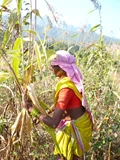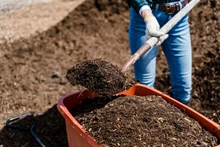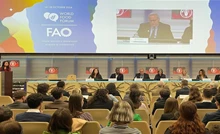
On February 6, 2023, massive earthquakes devastated southern Turkey and the northern section of the Syrian Arab Republic. Early assessments of the impact in Turkey show that agriculture, including crops, livestock, fisheries, and aquaculture, as well as rural infrastructure, have suffered considerable damage.
The earthquake devastated 11 vital agricultural provinces in Turkey, affecting 15.73 million people and more than 20% of the country's food production. The earthquake-affected region, known as Turkey's "fertile crescent," accounts for almost 15% of agricultural GDP and nearly 20% of Turkey's Agrifood exports.
More than one-third of the people in these hardest-hit provinces live in rural areas and depend on agriculture for a living. Supply chain disruptions and financial constraints are aggravating rural people' ability to acquire and afford productive inputs, leaving them unable to meet basic necessities and support their families. Early evaluations show that agriculture has suffered severe damage, with preliminary estimates of USD 1.3 billion in damage and USD 5.1 billion in losses. Damage refers to the expense of replacing or repairing physical assets and stocks that have been completely or substantially destroyed, such as agricultural infrastructure, cattle, and crops.
A loss, on the other hand, refers to the economic and productive impact of the damage, such as decreased food supply and increased food costs owing to the loss of stored crops. Aside from collapsed buildings and non-operational food sector structures, damaged crops and storage facilities, and animal losses and injuries, the earthquakes impacted key livestock breeding regions, demolishing barns and causing animal losses and injuries.
Foot-and-mouth disease risks have increased, as have concerns about poor animal husbandry conditions as a result of shelter shortages, feed constraints, and disrupted vaccine supply. Fish output has also been harmed, with 34 fish farms and three fishing ports affected, as well as the extinction of vital fish species. Due to the inability to resume operations, small-scale fishers and aquaculture producers may also face severe economic losses.
Access to agricultural supplies has become increasingly difficult in the region, and many agricultural and animal activities have been halted as a result of labour losses and shortages. As the summer crop season approaches, this precarious condition generates even more concerns. "With the damage to our irrigation systems and agricultural infrastructure, planting before the end of rainfall is our only chance to secure a robust crop for the coming year. We need fertilizer right now, before it's too late," said Mesut Ozer, a farmer from Nurdagi, Gaziantep.
FAO is urgently seeking USD 112 million in order to provide immediate and long-term assistance to earthquake-affected families and communities in Turkey. This includes USD 25 million from the United Nations Turkey Fast Appeal, which was released in February to deliver cash, livestock, and agricultural assistance to 900,000 rural people as quickly as possible.
Only USD 1.5 million of these requirements have been met so far, thanks to FAO's Special Fund for Emergency and Rehabilitation Activities (SFERA) and internal resources. With this, FAO has launched immediate measures to protect livelihoods, such as cash transfers, household infrastructure rehabilitation, livestock feed distribution, and quality inputs.
"The planting season is coming to an end. We urgently need to support our farmers by giving fertilizers and seeds," said Viorel Gutu, "FAO Subregional Coordinator for Central Asia and FAO Representative in Turkey. This is our only chance this year to sustain crop output levels. We also need to feed the animals to keep them healthy and productive. The evaluation of damages and losses in Syria is ongoing, and the FAO's response plan and strategy will be announced soon."











